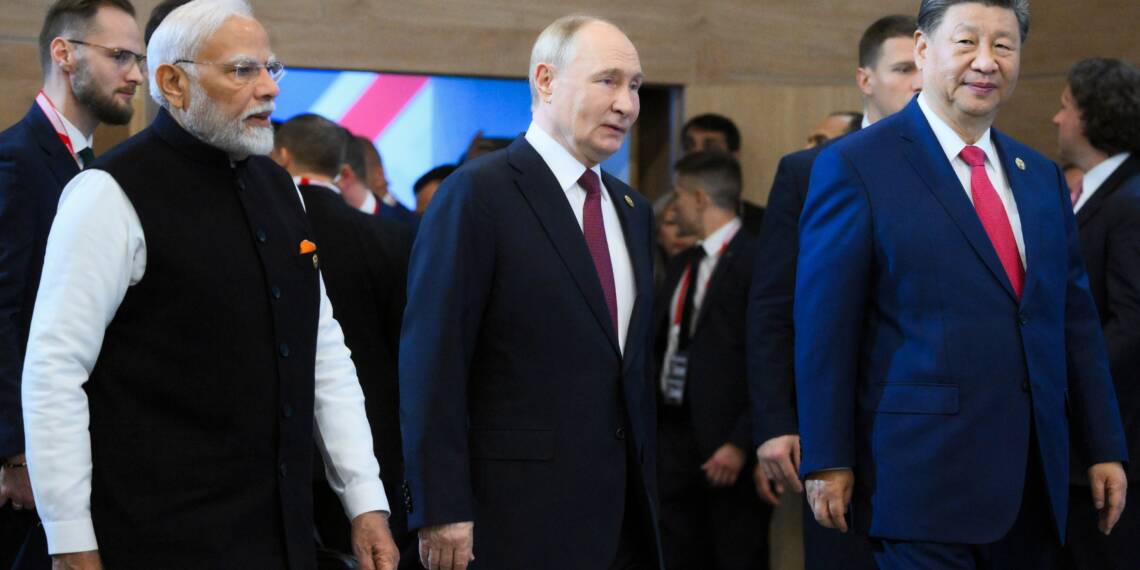The recent escalation between Israel and Iran has drawn significant international attention, especially within the BRICS bloc, which includes Brazil, Russia, India, China, South Africa. As the conflict intensifies, the question arises: how will each BRICS member respond and will they back Iran or Israel in this clash.
Russia: Strong Support for Iran
Russia and Iran cooperate militarily (e.g., in Syria), economically, and in opposition to Western influence. Iran has supplied drones to Russia for use in Ukraine, showing strategic defense cooperation.
Russia has expressed unequivocal support for Iran, condemning Israel’s airstrikes as “unprovoked and unacceptable.” Russian President Vladimir Putin and Chinese President Xi Jinping met with President Pezeshkian during the BRICS summit in Kazan, pledging to deepen ties with Iran. Putin highlighted the alignment of Russia and Iran in challenging the U.S.-led global order, aiming to promote a multipolar world.
China: Diplomatic Engagement
China has deepening economic ties with Iran including a 25-year strategic partnership deal signed in 2021. Beijing also relies on Iranian oil and invests in infrastructure via the Belt and Road Initiative.
China has also helped mediate the 2023 Iran-Saudi détente, raising its diplomatic clout in the Middle East.
In the current clash China has condemned the Israeli strikes on Iran, urging Israel to cease all military operations and warning against further escalation. Chinese President Xi Jinping has called for an immediate ceasefire and a comprehensive, just, and sustainable solution to the conflict, emphasizing the importance of dialogue and negotiation.
India: A Delicate Balancing Act
India depends on both Israeli defense technology and Iranian connectivity projects (e.g., Chabahar Port). It has long deep connections with both nations.
Iran has been a significant oil supplier for India which shares many common geological projects linking them to Iran and making them connected in the region.
India so far has maintained a cautious approach, advocating for restraint and dialogue. While India has historical ties with both Israel and Iran, it emphasizes the need for peaceful resolution and humanitarian support. India’s position reflects its broader foreign policy strategy of balancing relations with various global and regional powers.
Brazil: Calls for Peace and Stability
The Brazilian stance is generally non-confrontational and rooted in diplomatic, not strategic, engagement.
Under Lula da Silva, Brazil has emphasized Global South solidarity and multilateralism. Brazil has consistently advocated for peace negotiations and de-escalation in the Middle East. President Luiz Inácio Lula da Silva has emphasized the need to avoid escalation and encouraged countries to work together to end the conflict, highlighting the importance of diplomacy and dialogue.
South Africa: Advocacy for Palestinian Rights
Historically South Africa has been cooperative of Iran, especially in anti-apartheid and anti-colonial rhetoric.
It also shares alignment with Iran on opposition to U.S. hegemony and in support of Palestinian rights.
South Africa has been a vocal critic of Israeli actions, condemning them as violations of international law and calling for accountability. While South Africa supports Palestinian rights, its stance on Iran is more nuanced, balancing support for the Iran nuclear deal with considerations of regional stability.
Also read: Is this the Spark for World War III? Israel’s ‘Operation Rising Lion’ on Iran Explained
While the BRICS nation have considerable international power and have 3 major economies and military powerhouses in it the overall stance of the members is calling for an end to hostilities and for Israel to refrain from further action as well as for Iran to not escalate too. The stance is quite nuanced, but this might change if the US or other European nations decide to jump into this confrontation. If that happens the BRICS members are almost sure to get actively involved in the region leading to a much larger clash which is best avoided by all parties.








